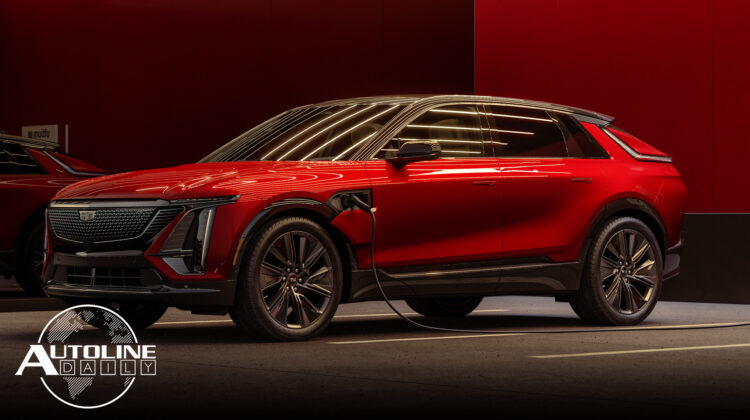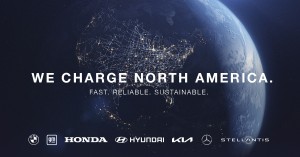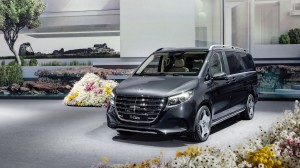
Follow us on social media:
Runtime: 11:04
– Legacy Auto to Challenge Tesla Charging Network
– Tesla Boosts Supercharger Capability
– Did EVs Cause That Ship Fire?
– GM Cruise Safety Stats Look Impressive
– OEMs Want Regs for AVs
– China Car Sales Forecast to Drop This Month
– LG Sees Slower EV Sales in EU & China
– Car Loans Get More Expensive in the U.S.
– Mercedes Updating Its Mid-Size Vans
– Volvo EX30 is Priced to Sell
Visit our sponsors to thank them for their support of Autoline Daily: Bridgestone, Intrepid Control Systems, and Schaeffler.
This is Autoline Daily, the show dedicated to enthusiasts of the global automotive industry.
LEGACY OEMs TO CHALLENGE TESLA SUPERCHARGER NETWORK
A powerful consortium of automakers are banding together to form an EV charging joint venture in North America. BMW, General Motors, Honda, Hyundai, Kia, Mercedes and Stellantis want to build and operate a network of at least 30,000 stations with each site offering multiple DC fast chargers that can accommodate both CCS and NACS. The stations will offer Plug & Charge technology and will first go into more populated areas and along highways that have restrooms, food and retail stores nearby. They will also operate a few flagship stations that offer even more amenities. The companies plan to power the network solely with renewable energy and they say it will be about a year before the first stations open in the U.S. and later in Canada.\
TESLA TO BOOST CHARGING UP TO 350 kW
Speaking of EV charging, Tesla confirmed that the newest version of its Supercharger, called V4, can charge at up to 350 kW. While none of Tesla’s current vehicles are able to charge at that rate, it’s believed the new Cybertruck will and Tesla is opening up its charging network to other automakers. That’s probably the same reason why V4s charging cable is longer and it seems like it will have other new features to accommodate different brands, like a screen and credit card reader. But here’s a question for you; do you think a charging network war between Tesla and pretty much everybody else is brewing in North America?
DID EVs CAUSE THAT SHIP FIRE?
We have more details about that cargo ship carrying nearly 3,000 cars that caught fire off the coast of the Netherlands, while traveling from Germany to Egypt. Automotive News reports that around 25 of vehicles were electric. About 350 were from Mercedes but the models haven’t been confirmed yet. VW says it is still investigating if it had any vehicles on board. GM and BMW weren’t able to provide immediate information. Stellantis, Toyota and Renault said it’s unlikely they had any vehicles on board. Ford and Nissan confirmed they did not and Tesla didn’t respond to a request for comment. Everyone wants to know if electric cars caused the fire, but at this point no one knows, so we’ll wait until a formal investigation settles the question.
GM CRUISE DROPS IMPRESSIVE SAFETY STATS
Kyle Vogt, the CEO of GM Cruise dropped some impressive safety stats during GM’s earnings call with analysts this week. Cruise now operates a fleet of 390 autonomous Bolts in several cities, he said, and they get in 54% fewer accidents than cars driven by humans who operate in similar situations to Cruise’s vehicles. That includes accidents where the autonomous car was sitting still and got rear ended by a distracted driver. Take out those rear enders, and those autonomous Bolts get in 92% fewer accidents than cars with a human behind the wheel. And if you only look at severe collisions, they get in 75% fewer crashes. Impressively, GM Cruise is handling 10,000 riders a week and it’s growing at 47% a MONTH! Vogt says that in the next few months they’re going to expand their fleet and the number of cities they operate in. But he says the real impact will come when they launch the Cruise Origin purpose-built AV later this year.
OEMs WANT US REGS FOR AVs
Meanwhile, in Washington DC, the head of the auto industry’s lobbying group, is warning lawmakers that the U.S. is in danger of falling behind China in autonomous technology. John Bozella, who heads up the Alliance for Automotive Innovation, said the U.S. could find itself behind China in AV technology, just as it’s behind in EV technology. The auto industry wants regulations from Congress so they have a clear legal path forward. But trial attorneys who represent car crash victims, safety advocates, and unions like the Teamsters are opposed to autonomous cars. They say the technology is not ready and that the threat from China is just fear-baiting fiction.
CHINA CAR SALES FORECAST TO DROP THIS MONTH
Yesterday we reported that registrations of locally-made cars were up 2.5% in China last month. And that seemed to suggest that the Chinese car market was getting back on its feet. But the China Passenger Car Association is forecasting automakers will sell only 1.7 million vehicles in July, a 8.6% drop from June and nearly a 5% drop from a year ago. And it says the second half of the year may not be much stronger as Chinese consumers cut back on buying big ticket items like cars.
LG SEES SLOWER EV SALES IN EU AND CHINA
There’s a similar story going on in Europe, but this involves electric cars. The EV battery maker LG Energy Solution is warning that it faces weaker EV demand in Europe than it was previously expecting. It even sees weaker EV demand in China. But it hasn’t cut its forecasts for the U.S. LG says EV demand in Europe is sluggish due to high inflation. The company also reported a lower quarterly profit than it forecasted but that was due to a one-off cost to pay for GM’s Chevy Bolt EV recall.
CAR LOANS GET MORE EXPENSIVE IN U.S.
It’s going to get more expensive to buy a new car in the U.S. The Federal Reserve raised its benchmark rate by a quarter of a point to 5.25-5.5%. According to Edmunds, that’s going to push the interest rates on car loans to about 7.2%. And used car rates will hit about 11%. To counter that, automakers increased incentive spending to an average of more than $2,000, per vehicle. But even with higher rates, Edmunds doesn’t expect that to hurt sales due to pent up demand.
MERCEDES TO LAUNCH NEW GENERATION OF EV VANS
In 2026, Mercedes-Benz Vans is coming out with a new line up of vans on its all-new all-electric architecture, what it calls VAN.EA. It says we can expect the same levels of luxury that we see in its passenger cars and expects EVs to account for more than 50% of its sales by the end of the decade. But until then, it’s bridging the gap with updated versions of its midsize van lineup. Overall styling is not changing that much, but we want to point out that the grilles look more upscale, you can even get a Mercedes hood ornament, and the wheel designs look much nicer. The interiors also get a better looking steering wheel and display screens. So, in general, look for nicer Mercedes vans.
VOLVO EX-30 IS PRICED TO SELL
Volvo unveiled the EX-30 in New York. This is its new small electric crossover that will start with a base price of only $34,950 in the U.S. market. That’s a pretty aggressive price considering the car is made in China, which means Volvo is probably eating a portion of that 27.5% import tariff. It didn’t provide a lot of details on the EV, but here are some of the highlights we have. The base, single motor model comes with 268 horsepower, a 69 kWh battery pack and 275 miles of EPA driving range. With all wheel drive the range is 265 miles. It can charge from 0 to 80% in 25 minutes at 153 kilowatts. A twin motor, 422 horsepower version will also be part of the lineup. To simplify the interior and to cut cost there is one 12.4 inch screen, and a sound bar that sits on top of the instrument panel. The back seat is rather cramped and the interior looks a bit cheap, but that’s not a surprise with the size and price of the car. The EX30 comes with 5G connectivity and you can do things like use a phone to lock or unlock the car. It also uses a lot of recycled steel, aluminum and plastics, and Volvo says it has a 25% smaller carbon footprint than any other vehicle it manufactures. The EX30 goes on sale in Europe this fall and in the U.S. early next summer.
Join us for Autoline After Hours this afternoon, when one of the topics will be the story that Reuters broke of how Tesla had teams of employees trying to discourage owners from bringing their cars in for service because they were not getting the driving range they expected. Joe White from Reuters and Tom Libby from S&P Global Mobility will be on the show, and, along with John and Gary, they’ll get to the bottom of what’s going on.
But that’s a wrap for this show. Thanks for tuning in.
Thanks to our partner for embedding Autoline Daily on its website: WardsAuto.com
Seamus and Sean McElroy cover the latest news in the automotive industry for Autoline Daily.







